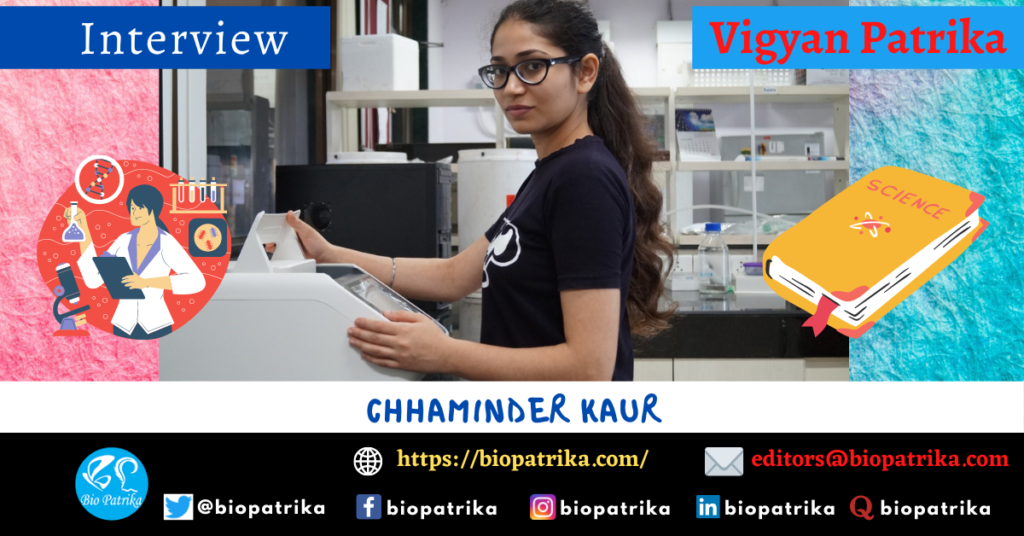Chhaminder Kaur’s interview with Bio Patrika hosting “Vigyaan Patrika,” a series of author interviews. Chhaminder is a doctoral candidate in the Department of Biosciences and Bioengineering at the Indian Institute of Technology Bombay. She has been intrigued with biology since her school days, which led her to pursue Bachelors in Biotechnology from Netaji Subhas Institute of Technology at Delhi. Having gained subject expertise in Biotechnology, she worked as a Patent Analyst in The Smart Cube in India where she helped the clients with knowledge about prior art and the latest developments in Biotechnology. To gain a deeper understanding of the field, she joined Molecular Parasitology Lab at IIT Bombay where her research interests revolve around studying the regulation of protein synthesis in the malarial parasite, Plasmodium falciparum and another apicomplexan parasite, Toxoplasma gondii. Chhaminder has published two peer-reviewed publications papers among which one of the publications has been recognized as the “Paper of the Month” July 2020 issue of the journal Parasitology. She has presented her work in both National as well as international conferences. Here, Chhaminder talks about her work on ‘Messenger RNAs with large numbers of upstream open reading frames are translated via leaky scanning and reinitiation in the asexual stages of Plasmodium falciparum’ published in Parasitology.
How would you explain your paper’s key results to the non-scientific community?
All organisms are made up of basic biomolecules or building blocks of life. These biomolecules include deoxyribonucleic acid (DNA), ribonucleic acid (RNA), and protein. Out of these three, proteins are the molecules that make the organism functional by playing multiple roles such as digesting food, building muscles, carrying oxygen to different body parts and so on and therefore, become essential for survival. The information required to synthesize proteins is stored in DNA. This information is copied on RNA and made into protein. This process of synthesizing proteins from RNA is known as translation.
I am trying to understand this process in parasites, Plasmodium falciparum and Toxoplasma gondii that cause malaria and toxoplasmosis in humans, respectively. Translation in these parasites is of interest because RNA in these parasites contain elements known as “upstream open reading frames” (uORFs) in huge numbers. The uORFs are like small hurdles that block the translation process. It is fascinating that even though these parasites have huge numbers of uORFs that hinder translation, they are able to make proteins and survive. The parasites are able to overcome the hurdles and make the proteins by employing leaky scanning and reinitiation. These are unusual translation mechanism used by the parasite to bypass the uORFs. My research interest lies in uncovering these unusual mechanisms through which these parasites are managing the translation of the protein that are involved in pathogenicity and stress response.

What are the possible consequences of these findings for your research area?
In the presence of uORFs, the parasites P. falciparum and T. gondii use unusual translation mechanisms to synthesize certain proteins that play a crucial role in increasing their infectivity. It would be interesting to study how these proteins are being translated in order to gain a better understanding of the biology of the parasites. We have barely scratched the surface of uORF-based translation regulation in these parasites that cause widespread infection and fatality. Unravelling the mechanisms behind the regulation would allow us to make better targetted drugs to eliminate these parasites.
What was the exciting moment (eureka moment) during your research?
There was not just a single eureka moment that I can pinpoint. There have been many instances, both big and small that were exciting for me. It was a gradual process, a compilation of many experiments that led us to understand what we know now about the parasite now.
What do you hope to do next?
The next step would be to understand the extent of uORF-mediated translational regulation happening in the parasites, given the sheer number of uORFs they harbor. By employing high-throughput technologies such as ribosome profiling, we can identify uORFs that the parasites employ to increase their infectivity, cell growth, and stress response. Another area open to exploration is identifying the proteins that help the parasite in overcoming the hurdles posed by uORFs. One of such protein has already been identified in P. falciparum. This proves that there are some unique proteins, which help the parasites in translation in the presence of multiple uORFs.
Where do you seek scientific inspiration?
My scientific inspiration stems from my curiosity. It is my curiosity to know more that keep me coming back to the lab even after my experiments have failed the day before. To channel my curiosity in the right direction, I have learnt during my PhD training to ask the right questions, which is extremely crucial to do good science, and to be equally intrigued by unexpected answers.
How do you intend to help Indian science improve?
At this stage in my scientific career, I contribute by engaging in good science that is ethical. In the Molecular Parasitology lab, I have learnt to focus on the scientific method of doing science without any bias that might affect the result in any way. Furthermore, I believe that it is crucial for scientists to understand the importance of communicating their findings accurately and effectively to the communities, both scientific and non-scientific. This will lead to an increase in awareness and a decrease in the spread of misinformation among the masses.
Reference
Kaur, C., Kumar, M., & Patankar, S. (2020). Messenger RNAs with large numbers of upstream open reading frames are translated via leaky scanning and reinitiation in the asexual stages of Plasmodium falciparum. Parasitology, 147(10), 1100-1113. doi:10.1017/S0031182020000840
Lab: https://www.bio.iitb.ac.in/~patankar/
Edited by: Nivedita Kamath
